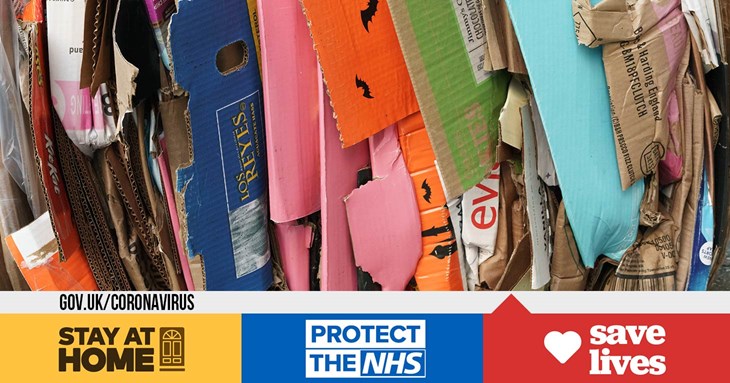Recycling during Covid-19
Published: 4 May 2020

In his regular feature, Denis the Dustcart talks about how we can all recycle more during the Covid-19 crisis.
You can follow Denis on his Facebook page to keep up with information about Recycling issues.
Many of us are, of course, spending more time at home than we’ve ever done before. This means eating breakfast, lunch and dinner at home every day. It means more online purchasing and therefore more cardboard entering our homes that would otherwise have been removed by high-street stores before we bought it. It means more packaging in our green bins and less in the recycling bins at work.
Please make sure to recycle everything you can.
If you run out of room in your green bin, you have two options: order another one for free from exeter.gov.uk/binorders or place out extra recycling on collection day in bags labelled ‘recycling’.
Here are a few things to bear in mind:
Cardboard
Home delivery is up for obvious reasons. This means more cardboard entering our homes. All of it can be recycled.
If you lack room in your green bin, flatten the card out and place it beside your bin for collection. Protect it from the rain with an opened-out bag, if needed.
It’s vital we recycle all the cardboard we can. With most high street stores and businesses closed, the major source of cardboard has been slashed. Delivery of medical supplies relies on cardboard. Please recycle the cardboard you bring in to your home.
Remember, the brown paper certain major online marketplaces use to pack small items inside huge boxes can also be recycled, if you can’t reuse it as wrapping paper.
Toilet rolls
I know, it seems obvious. But often these get dropped in the bathroom bin along with non-recyclable items – like cotton wool and disposable razors – so it’s important to sort the contents of this bin before throwing them away. In other words, don’t empty your plughole hair into a bin full of lovely recyclable stuff, because then you won’t want to sort it.
The same goes for:
Shampoo bottles, face-cream tubes, Vaseline pots
If the plastic is ‘squashable’ – i.e. is not hard like makeup pots or brittle like coat-hangers – then it can be recycled. Make sure all containers are as empty as possible. The caps can also be recycled.
Milk bottles
HDPE plastic is about the most recyclable and useful plastic there is. With more people taking their morning and afternoon coffees at home, there should be more milk bottles coming through our gates.
If your milk goes off, don’t chuck it away inside the bottle. Empty it down the sink (holding your nose), then recycle the bottle.
If you’re worried you have an excess that will go off, you can freeze it either in the bottle or in ice-cube trays. It can look a little yellow in its frozen state, but, once it’s thawed, it returns to its normal white.
Tins and cans
Again, this seems obvious. However, the number of drinks tins we see coming through our plant for recycling should be higher. Not that we’re suggesting people drink more; it’s just that, if everyone recycled all the tins they brought into their home, we’d produce many more bales of aluminium for recycling than we do now.
Aluminium is the most valuable material we can sell for recycling. Every penny we make from recycling goes back into providing public services. Please, recycle all your tins.
As for steel cans, please just make sure they’re empty before putting them in your green bin. We don’t mind a smear of sauce, but half a tin of beans is likely to contaminate the entire bin – especially the paper.
When you open the can, leave a small part of the lid attached so you can fold it back inside the can. If you do take the lid off completely, pop it back inside the empty can and squeeze the can so the lid can’t come out.
Meat trays
More people are eating at home, which means more food packaging going out with the bins. You should recycle all your food trays except the black ones. This includes meat trays. All they need is a quick rinse under the tap.
Glass and cartons
Our glass and carton banks remain open, but should be used only on an essential food-shopping trip or on your once-daily exercise.
Please don’t leave glass or cartons beside the banks. If the banks are full, take your glass and cartons home.
Textiles
The clothes banks are closed until further notice. This is because Salvation Army, which empties them, is unable to carry out its collection rounds. Textiles are not technically considered ‘waste’, therefore the collection staff do not have key-worker status.
Please do not leave ‘donations’ beside the banks. Our staff have had to clear up a lot of bags from around the textile banks in recent weeks –a lot of extra work during a difficult time.
Remember: wash your bin handles before you put your bin out and after you’ve brought it back in.
Bin reminder emails
If, like many of us, you are struggling to remember what day it is at the moment, you can subscribe to our bin-reminder email service. This will send you a reminder the day before your bin day; it will even remind you not to put your bin out when there is a bank holiday day change and then another reminder to put the bin out on the day before your amended day.
Subscribe here: exeter.gov.uk/binreminder
Thanks, everyone, for your continued efforts. Recycling is not only good for the environment, it’s also helping to keep the local economy going – and every bit of it helps.
